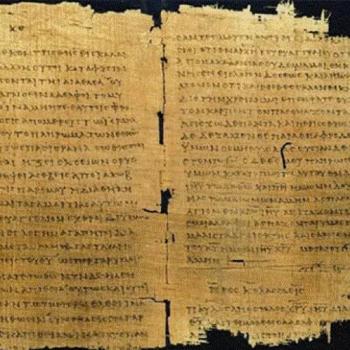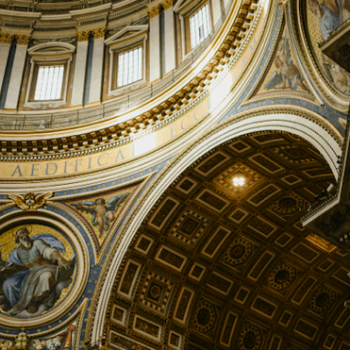
“They devoted themselves to the apostles’ teaching and to fellowship, to the breaking of bread and to prayer. Everyone was filled with awe at the many wonders and signs performed by the apostles. All the believers were together and had everything in common. They sold property and possessions to give to anyone who had need. Every day they continued to meet together in the temple courts. They broke bread in their homes and ate together with glad and sincere hearts, praising God and enjoying the favor of all the people. And the Lord added to their number daily those who were being saved.”
– Acts 2: 42-47
What did the Early Church Do?
When I read about this community that existed, I can’t help but wonder if we are missing something. Followers of “The Way” were incredibly different from those around them. They wouldn’t support the Roman Gladiatorial events due to the bloodshed, they would adopt babies from trash bins, and they treated slaves as family members. The early church members were made fun of for being “anti-social” and they were even charged with “atheism” due to their unengagement with the festivities and worship of the gods. So what did they do instead?
They Celebrated the Lord’s Supper
Jesus commanded the apostles to break bread and drink wine as a remembrance of his broken body and poured out blood for them. Can you imagine sitting at a meal with your community of Faith and using it as a time to remember Jesus’ death on the cross? At this table, you have slaves and free, men and women, rich and poor. All of these people may have seen friends and family attacked, labeled with scars and bruises from their abuse, tortured with knives, or imprisoned. Have we lost something with how we treat communion?
There was an Easter Service I attended once where the pastor got up in between songs, sped through the presentation of the bread (1 minute), and sped through the presentation of juice (1 minute) and then it was business as usual.
Meanwhile, the 1st-century church is sitting together maimed for their faith as they remember the broken body of their Lord.
They Prayed
How often do you pray each day? If I were honest, some days I pray downwards of 0 times for 0 minutes. And when I do it’s often only 1 or 2 minutes. This is something I am not proud of. And yet, it is a practice I continue to ignore.
The early church devoted themselves to prayer. They took time to communicate with the Lord of the universe. They were convinced that God not only heard their prayers but would answer according to His will and according to what was good for those who loved Him. That’s powerful. Sometimes I wonder if we have this same expectation for God to move in power, authority, and care.
They Engaged in Fellowship
Who would you take a crucifixion for? In John 13: 34-35 we see Jesus give the command to love one another as He had loved his followers. How does Jesus love his followers:
He washes their feet.
Jesus leaves heaven to become a servant of all.
He teaches them.
Jesus answers their questions.
He empowers them to carry out His mission.
And of course: He dies for them.
Honestly, it isn’t often that I look across the rows of seats in my Church community and think (I would die for that person when push comes to shove.) Yet this was the type of fellowship that the early Church had. What separated the early Church from the rest of the Roman world was that there was an understanding that they showed a radical love for each other that wasn’t seen before. There was no need among the believers because instead of buying into the cultural message that might makes right, the early Church made it a point to care “for the Widows and Orphans in their midst.” The fellowship in the early Church was radical and it’s a type of fellowship that Christians must fight for.
They Devoted Themselves to the Apostle’s Teaching
How often have you read your Bible this week? Would consider yourself a devotee of the teachings of the apostles? Do you pray for ways to implement the teachings of the apostles in your life? Do you make notes of what the apostles teach?
The early Church had the benefit of sitting at the feet of the people who saw and spoke with Jesus. They were on the ground and in the trenches with the Son of God Himself. These guys saw Him heal, sweat blood in the garden, call out the Pharisees, teach about the Kingdom of Heaven, draw crowds, and push them away. They watched Him clear the temple, saw His risen self, eating with Him afterward. Can you imagine the clamor to see these guys? They would know a thing or 2 about following Jesus. Even Paul, who didn’t follow Jesus during His ministry on earth and who sought to snuff out the Church, checked His gospel with the other apostles to make sure it was accurate. He had the same Pharisaic upbringing as many rabbis would have and knew the types of things that Jesus would teach.
When they began to write letters, they were immediately recognized by the way that they spoke and by what they said. The apostles were known. And we can be confident that the words that we have in our New Testament are some of the very words that the early Church heard.
As I Think About the Early Church…
… I can’t help but wonder at what’s missing. I think that most American churches are well-meaning in what they do. And people who attend churches and claim Christ are also. After all, we want people to feel welcomed as they come through the door and know that they are cared for by our actions. However, I think we should all ask this question: What is driving our church Community? We would all like to think that it’s the commands of Jesus and the Apostles and that our mission is lifting Christ above every name, power, and authority figure. Yet, how many distractions are brought to us from well-meaning members of the Body:
- Who is preaching one week vs the next
- If you have childcare available or not
- The style of music
- The Programs you have available for kids and teens
- Topics of Discussion that are considered “too political”
- How long the service is.
- Who is greeting at the doors or not
Are these things the pivot point for your church community? Out of sincerity and genuine care, we as ministers bend over backward to make sure that all of these things are up to par with public opinion of the body… But sometimes the most loving thing to do may be to deny the body what it’s asking for. If our Churches have these things as their focus instead of the blatant commands of Jesus and the Apostles, then how much will we regret the wasted time in the end?
My prayer is that as we see a decline in church attendance in the West, we return to the simplicity and authenticity of the Early Church and what truly made it radical. We can use this season of pruning to bring back the practices that the early Church engaged in.
Do You Think there is a difference between the American Church and that of the 1st Century? Drop a comment below!
If you wish to continue to follow our content…
Make sure to subscribe to our Newsletter!
Find us on X @TheistThinking
You can follow us on Instagram at the_thinking_theist
You can find the rest of our articles HERE












